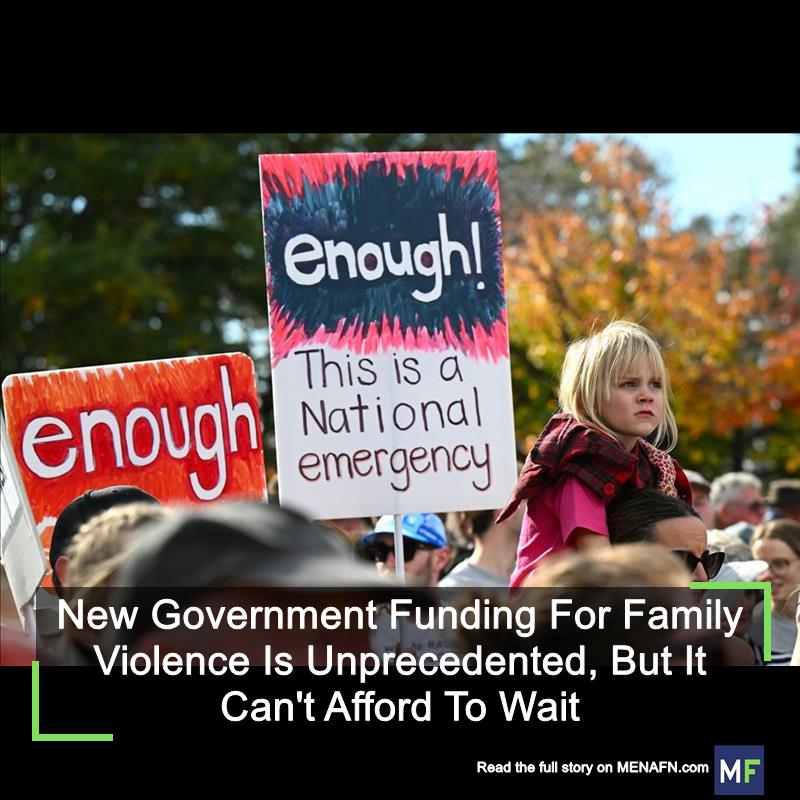
New Government Funding For Family Violence Is Unprecedented, But It Can't Afford To Wait
For years, specialist support services, community legal services, therapeutic responses and men's behaviour change programs have been saying they can't keep up with the demand from people living with family and sexual violence. Long wait lists, delayed access to support and inadequate legal representation are just some of the problems victim-survivors have faced due to this under-resourcing.
When the service sector cannot respond to all the calls for assistance and intervention it receives, victim-survivors are left in harm's way. Their lives may be at risk. And there are lost opportunities to intervene with people using violence to prevent their behaviour from escalating further.
Previously, the sector has estimated it needs approximately $1 billion per year to meet the needs of Australians experiencing family and sexual violence. While the current announcement does not meet that demand, it is an unprecedented investment in frontline services and a very welcome one.
What's in the package?The announcement from National Cabinet places the safety and recovery of victim-survivors front and centre. It promotes holding people who use family and sexual violence accountable. It does this by strengthening legal systems, specialist services, and programs for perpetrator change.
The plan addresses the impacts of violence on children and young people. It also promises to improve the coordination and stability of family and sexual violence responses across the country.
Specific measures that will receive a boost in funding include:
-
$3.9 billion over five years to the family, domestic and sexual violence sector, and a commitment to long-term funding certainty for services
an $800 million increase in legal assistance funding to services addressing gender-based violence, over five years a more than $80 million boost to trauma-informed support for children and young people to promote recovery and intervene early to prevent inter-generational violence.
There were commitments from first ministers to work collaboratively on several national reform areas.
These include a shared national risk assessment framework for family violence and information sharing systems to better respond to high-risk perpetrators.
There'll also be an audit of government systems that are being weaponised by perpetrators as a tool of abuse.
The announcement substantially extends previous funding commitments, including the nearly $1 billion in funding announced in May . That money extended the Leaving Violence Program . Also the announcement last year of $100 million over five years to deliver targeted prevention activity across the community.
Together, this investment goes a long way towards implementing the holistic and multi-sectoral approach identified in the National Plan to End Violence Against Women and Children .
The national plan identifies four priority areas for action:
-
prevention
early intervention responses
recovery and healing.
Each of these is crucial to addressing family and sexual violence, both now and into the future.
This national approach promises to work collaboratively across all levels of government. To be successful, it will take sustained efforts across governments, by justice and legal institutions and across the community services sector. That's not to mention in our workplaces and schools, too.
There should be no wrong door for someone experiencing family or sexual violence to be able to access information and be connected with specialist services.
Where to from here?The immediate and crucial issue is the timing for the first of these funds to be available to front line services. The funding package is due to start roll out from July 1 next year.
But to meet demand right now, many family and sexual violence services need that funding to commence much more urgently.
Many men's behaviour change programs have also faced long waitlists and a lack of capacity due to insufficient funding.
There is also concern about workforce challenges facing the family and sexual violence sectors.
Long term under-investment has meant these specialist service workers often face short-term contracts, precarious work and unreasonable workloads. All this contributes to worker burnout.
Efforts to train new family violence caseworkers are hampered by expensive course fees and a lack of flexible study options. The same issues stop existing community workers from being able to specialise in family violence response work.
If we really are to end violence against women in“one generation”, as the national plan intends, then we must continue to work together as a community.
Crucially, we must hold governments to account to ensure that the promised funding is delivered where it is needed – and soon.
The National Sexual Assault, Family and Domestic Violence Counselling Line – 1800 RESPECT (1800 737 732) – is available 24 hours a day, seven days a week for any Australian who has experienced, or is at risk of, family and domestic violence and/or sexual assault.

Legal Disclaimer:
MENAFN provides the
information “as is” without warranty of any kind. We do not accept
any responsibility or liability for the accuracy, content, images,
videos, licenses, completeness, legality, or reliability of the information
contained in this article. If you have any complaints or copyright
issues related to this article, kindly contact the provider above.


















Comments
No comment